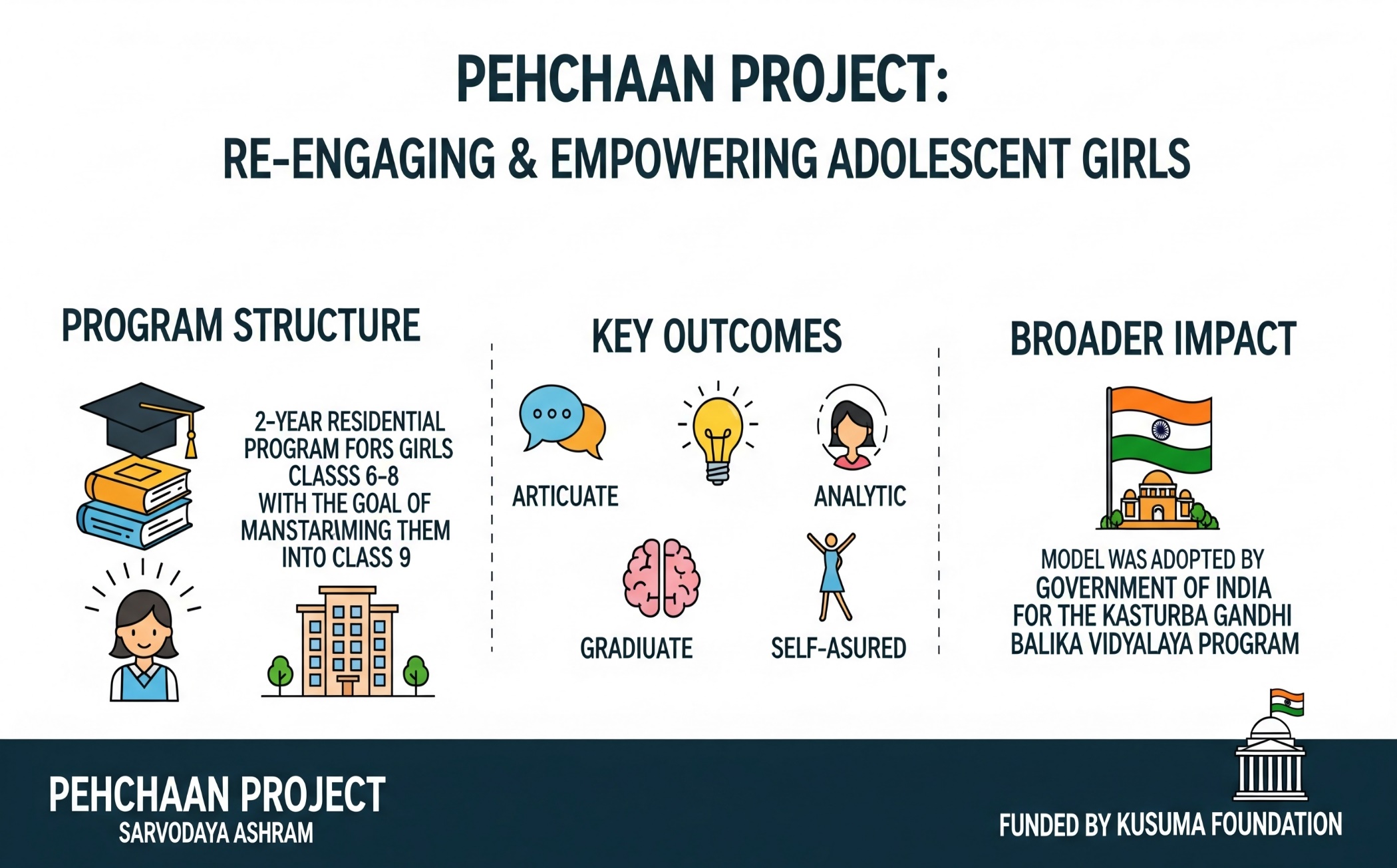The Pehchaan Project, a significant and strategically designed initiative by Sarvodaya Ashram, extended its commitment to educational equity by targeting a crucial demographic: adolescent dropout girls. Building upon the successful model of bridge education, Pehchaan aimed to provide this vulnerable group with an accelerated learning pathway, enabling their successful reintegration into the formal secondary education system. This vital program was generously funded by the Kusuma Foundation, underscoring a shared vision for empowering girls through education.
Program Objectives and Structure:
The core objective of the Pehchaan Project was to identify adolescent dropout girls who have missed crucial years of schooling, and to provide them with a comprehensive and tailored education covering Class 6 to Class 8 within a two-year intensive residential program. The ultimate goal was to equip these girls with the necessary academic foundation, confidence, and life skills to seamlessly mainstream into Class 9 of formal educational institutions.
Specialized Pedagogy and Curriculum Design:
Pehchaan’s pedagogical approach was meticulously crafted to address the unique learning needs of older dropouts. A specially designed curriculum formed the backbone of the program, condensing the essential learning outcomes of three academic years into a rigorous yet engaging two-year period. This curriculum focused not only on academic mastery but also on fostering critical thinking, problem-solving abilities, and practical application of knowledge relevant to this age group.
Recognizing the potential for learning fatigue, the program maintained a dynamic and interactive learning environment. While specifics on daily class structure were tailored, it incorporated a blend of formal instruction with activity-based, experiential, and collaborative learning methodologies. This ensured that lessons are not merely theoretical but resonate with the girls’ experiences and encourage active participation. The curriculum was also designed to instil and reinforce essential human and social values, promoting empathy, responsibility, and civic awareness. Regular project-based learning, case studies, and group assignments were integral, encouraging independent thought, teamwork, and the application of learned concepts to real-world scenarios.
The major academic subjects within the Pehchaan curriculum encompass core areas such as advanced language skills (including continued English language development), mathematics, science, social studies, and potentially introductory vocational or life skills. The integration of social studies was particularly emphasized, extending beyond basic environmental understanding to encompass civics, history, and a deeper comprehension of societal structures and personal rights, preparing them for responsible citizenship.
Holistic Development and Empowering Outcomes:
Graduates from the Pehchaan Project demonstrated significant personal growth, emerging as articulate, analytical, self-assured, and community-oriented individuals. Beyond academic achievement, the program aimed to cultivate qualities such as resilience, leadership potential, and an enhanced capacity for critical inquiry. They were not only academically prepared but also possessed the intrinsic motivation and capability to independently seek out information, adapt to new learning environments, and navigate future challenges.
The residential setting within the supportive and development-oriented environment of Sarvodaya Ashram was crucial. It provided a stable and nurturing space, away from potential societal pressures or economic constraints that led to their initial dropout. This environment offered ample opportunities for non-formal learning, personal mentorship, and peer interaction, fostering a strong sense of belonging and mutual support.
Community Engagement and Sustainable Integration:
The success of Pehchaan was inextricably linked to robust community engagement. The project actively involved parents and guardians through regular meetings, workshops, and awareness campaigns on the long-term benefits of girls’ education. This continuous dialogue ensured family support for the girls’ participation and future educational pursuits.
A critical component of Pehchaan’s strategy was its dedicated focus on the girls’ seamless transition into the formal education system upon program completion. Sarvodaya Ashram’s dedicated team played an instrumental role in facilitating admissions to Class 9, providing necessary documentation, and liaising with mainstream schools. Furthermore, ongoing follow-up and retention efforts were implemented to ensure the girls successfully continued their academic journey and thrived in their new school environments.
Achievements and Broader Impact:
With the dedicated support of the Kusuma Foundation, the Pehchaan Project achieved substantial success in empowering a significant number of adolescent dropout girls. By providing this targeted, accelerated, and holistic educational intervention, the project not only transformed individual lives but also contributed directly to national educational goals and gender equality. Its success served as a powerful model for addressing the persistent challenge of secondary school dropouts, demonstrating that with focused intervention and unwavering support, every girl deserves and can achieve access to a brighter educational future.
This model was adopted and replicated by the Government of India in the form of Kastusrba Gandhi Balika Vidyalaya to improve the enrolment status and to provide quality education to the girls from the marginalized sections of the society.

